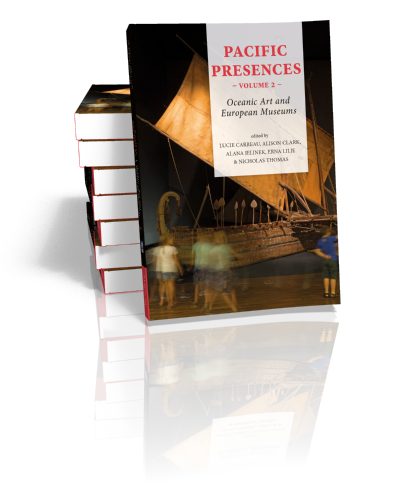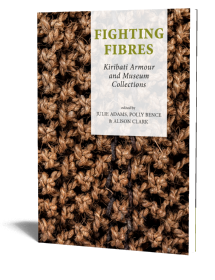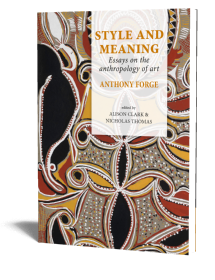Pacific Presences - Volume 2
Oceanic Art and European Museums
Edited by Lucie Carreau, Alison Clark, Alana Jelinek, Erna Lilje & Nicholas Thomas | 2018

Pacific Presences - Volume 2
Oceanic Art and European Museums
Edited by Lucie Carreau, Alison Clark, Alana Jelinek, Erna Lilje & Nicholas Thomas | 2018
Paperback ISBN: 9789088906268 | Hardback ISBN: 9789088906275 | Imprint: Sidestone Press | Format: 182x257mm | 512 pp. | Pacific Presences 4B | Language: English | 78 illus. (bw) | 265 illus. (fc) | Keywords: anthropology, art history, museology, Melanesia, Micronesia, Pacific island studies, colonialism, collecting | download cover
Read online or downloaded 2368 times
-
Digital & Online access
This is a full Open Access publication, click below to buy in print, browse, or download for free.
-
Buy via Sidestone (EU & UK)
-
Buy via our Distributors (WORLD)
For non-EU or UK destinations you can buy our books via our international distributors. Although prices may vary this will ensure speedy delivery and reduction in shipping costs or import tax. But you can also order with us directly via the module above.
UK international distributor
USA international distributor
-
Bookinfo
Paperback ISBN: 9789088906268 | Hardback ISBN: 9789088906275 | Imprint: Sidestone Press | Format: 182x257mm | 512 pp. | Pacific Presences 4B | Language: English | 78 illus. (bw) | 265 illus. (fc) | Keywords: anthropology, art history, museology, Melanesia, Micronesia, Pacific island studies, colonialism, collecting | download cover
Read online or downloaded 2368 times

We will plant a tree for each order containing a paperback or hardback book via OneTreePlanted.org.
Hundreds of thousands of works of art and artefacts from many parts of the Pacific are dispersed across European museums. They range from seemingly quotidian things such as fish-hooks and baskets to great sculptures of divinities, architectural forms and canoes. These collections constitute a remarkable resource for understanding history and society across Oceania, cross-cultural encounters since the voyages of Captain Cook, and the colonial transformations that have taken place since. They are also collections of profound importance for Islanders today, who have varied responses to their displaced heritage, and renewed interest in ancestral forms and practices.
This two-volume book enlarges understandings of Oceanic art and enables new reflection upon museums and ways of working in and around them. In dialogue with Islanders’ perspectives, It exemplifies a growing commitment on the part of scholars and curators to work collaboratively and responsively.
Volume II illustrates the sheer variety of Pacific artefacts and histories in museums, and similarly the heterogeneity of the issues and opportunities that they raise. Over thirty essays explore materialities, collection histories, legacies of empire, and contemporary projects.
This books is part of the Pacific Presences series. Click here to see the other volumes in this series.
Preface
Introduction
Part one: Materialities
1. Fibre skirts: continuity and change
Erna Lilje
2. Shell money and context in Western Island Melanesia
Katherine Szabo
3. Aitutaki patterns or listening to the voices of the Ancestors: research on Aitutaki ta’unga in European Museums
Michaela Appel and Ngaa Kitai Taria Pureariki
4. Unpacking cosmologies: frigate bird and turtle shell headdresses in Nauru
Maia Nuku
5. Reaching across the Ocean’: Barkcloth in Oceania and beyond
Anna-Karina Hermkens
6. ‘U’u: an unfinished inquiry into the history and adornment of Marquesan clubs
Nicholas Thomas
Part two: Collection histories and exhibitions
7. Haphazard Histories: tracing Kanak collections in UK museums
Julie Adams
8. Inaccuracies, inconsistencies and implications: researching Kiribati coconut fibre armour in UK collections
Polly Bence
9. From Russia with love: Nikolai Miklouho-Maclay’s Pacific collections
Elena Govor
10. Collecting procedure unknown: contextualising the Max Biermann collection in the Museum Fünf Kontinente in Munich
Hilke Thode-Arora
11. Made to measure: photographs from the Templeton Crocker expedition
Lucie Carreau
12. German women collectors in the Pacific: Elizabeth Krämer-Bannow and Antonie Brandeis
Amiria Salmond
13. The illustration of culture: work on paper in the art history of Oceana
Nicholas Thomas
14. Two Germanies: ethnographic museums, (post)colonial exhibitions, and the ‘cold odyssey’ of Pacific Objects between East and West
Philipp Schorch
15. Museum Dreams: the rise and fall of a ‘Port-Vila Museum
Peter Brunt
Part three: Legacies of Empire
16. Kings, Rangatira and relationships: the enduring meanings of ‘treasure’ exchanges between Māori and Europeans in 1830s Whangaroa
Deidre Brown
17. An early Tongan ngatu tahina in Sweden
Nicholas Thomas
18. Wilful amnesia? Contemporary Dutch narratives about western New Guinea
Fanny Wonu Veys
19. A glimmering presence: the unheard Melanesian voices of St Barnabas Memorial Chapel, Norfolk Island
Lucie Carreau
20. The Titikaveka barkcloth: a preliminary account
Nicholas Thomas
21. ‘The woman who walks’: Lucy Evelyn Cheesman, her collecting and contacts in western New Guinea
Katharina Haslwanter
17. History and Cultural Identity: commemorating the arrival of the British in Kiribati
Alison Clark
23. Makereti and the Pitt Rivers Museum, 1921–1930, and beyond
Ngahuia Te Awekotuku and Jeremy Coote
Part four: Contemporary activations
24. ARCHIVES Te Wāhi Pounamu
Areta Wilkinson and Mark Adams
25. Hoe Whakairo: painted paddles from New Zealand
Steve Gibbs, Billie Lythberg and Amiria Salmond
26. Toi Hauiti and Hinematioro: a Māori ancestor in a German castle
Wayne Ngata, Billie Lythberg and Amiria Salmond
27. Reinvigorating the study of Micronesain objects in European museums: collections from Pohnpei and Kosrae, Federated States of Micronesia
Helen A. Alderson
28. Knowing and not knowing
Alana Jelinek
29. Interview
Kaetaeta Watson, Chris Charteris, Lizzy Leckie and Alison Clark
30. Piecing together the past: reflections on replicating and ancestral tiputa with contemporary fabrics
Pauline Reynolds
31. Interview
Dairi Arua and Erna Lilje
32. ‘In Process’
Alana Jelinek
33. Backhand and full tusks: museology and the mused
Rosanna Raymond
Epilogue
Endnotes
Select bibliography
Contributors’ Biographies
Acknowledgements
Index
Prof. dr. Nicholas Thomas
Nicholas Thomas did doctoral research in the Marquesas Islands and has since written extensively on exploration and cross-cultural encounters and on art histories in the Pacific. He has been Director of the Museum of Archaeology and Anthropology in Cambridge since 2006.
Lucie Carreau
Lucie Carreau is a researcher based at the Museum of Archaeology and Anthropology (MAA), University of Cambridge. Educated at the École du Louvre (Paris) and Sainsbury Research Unit (Norwich), her work focuses on the history of collecting and collections in the19th century and early 20th century and the role of objects in mediating relationships between Pacific Islanders and European visitors.
Erna Lilje
Erna Lilje pursues the idea that collections can reveal more about the people who made and used the artefacts they hold by bringing to bear an interdisciplinary approach that combines a close examination of these with field-based research. She believes that the most quotidian objects can offer insights into the lives of those people least represented in historical sources, such as women.
Alana Jelinek
Alana Jelinek is a practising artist, exhibiting nationally and internationally for over 25 years. She works in a wide range of media, including participatory, film, sound, novel-writing and painting. From 2009 until 2017 she worked with the Museum of Archaeology and Anthropology, University of Cambridge, first as Arts and Humanities Research Fellow (2009-2014) and then as Senior Researcher for Pacific Presences (2013-2018).
Dr. Alison Clark
Alison Clark is a Research Associate at the Museum of Archaeology and Anthropology, University of Cambridge. Both her masters (2007) and PhD (2013) theses were on the Indigenous Australian collections at the British Museum. Her current research is focused on Kiribati, where she is interested in the contemporary resonance of historic museum collections, and the revival of certain cultural practices. She has previously worked on projects at the British Museum, and the October Gallery in London.
Abstract:
Hundreds of thousands of works of art and artefacts from many parts of the Pacific are dispersed across European museums. They range from seemingly quotidian things such as fish-hooks and baskets to great sculptures of divinities, architectural forms and canoes. These collections constitute a remarkable resource for understanding history and society across Oceania, cross-cultural encounters since the voyages of Captain Cook, and the colonial transformations that have taken place since. They are also collections of profound importance for Islanders today, who have varied responses to their displaced heritage, and renewed interest in ancestral forms and practices.
This two-volume book enlarges understandings of Oceanic art and enables new reflection upon museums and ways of working in and around them. In dialogue with Islanders’ perspectives, It exemplifies a growing commitment on the part of scholars and curators to work collaboratively and responsively.
Volume II illustrates the sheer variety of Pacific artefacts and histories in museums, and similarly the heterogeneity of the issues and opportunities that they raise. Over thirty essays explore materialities, collection histories, legacies of empire, and contemporary projects.
This books is part of the Pacific Presences series. Click here to see the other volumes in this series.
Contents
Preface
Introduction
Part one: Materialities
1. Fibre skirts: continuity and change
Erna Lilje
2. Shell money and context in Western Island Melanesia
Katherine Szabo
3. Aitutaki patterns or listening to the voices of the Ancestors: research on Aitutaki ta’unga in European Museums
Michaela Appel and Ngaa Kitai Taria Pureariki
4. Unpacking cosmologies: frigate bird and turtle shell headdresses in Nauru
Maia Nuku
5. Reaching across the Ocean’: Barkcloth in Oceania and beyond
Anna-Karina Hermkens
6. ‘U’u: an unfinished inquiry into the history and adornment of Marquesan clubs
Nicholas Thomas
Part two: Collection histories and exhibitions
7. Haphazard Histories: tracing Kanak collections in UK museums
Julie Adams
8. Inaccuracies, inconsistencies and implications: researching Kiribati coconut fibre armour in UK collections
Polly Bence
9. From Russia with love: Nikolai Miklouho-Maclay’s Pacific collections
Elena Govor
10. Collecting procedure unknown: contextualising the Max Biermann collection in the Museum Fünf Kontinente in Munich
Hilke Thode-Arora
11. Made to measure: photographs from the Templeton Crocker expedition
Lucie Carreau
12. German women collectors in the Pacific: Elizabeth Krämer-Bannow and Antonie Brandeis
Amiria Salmond
13. The illustration of culture: work on paper in the art history of Oceana
Nicholas Thomas
14. Two Germanies: ethnographic museums, (post)colonial exhibitions, and the ‘cold odyssey’ of Pacific Objects between East and West
Philipp Schorch
15. Museum Dreams: the rise and fall of a ‘Port-Vila Museum
Peter Brunt
Part three: Legacies of Empire
16. Kings, Rangatira and relationships: the enduring meanings of ‘treasure’ exchanges between Māori and Europeans in 1830s Whangaroa
Deidre Brown
17. An early Tongan ngatu tahina in Sweden
Nicholas Thomas
18. Wilful amnesia? Contemporary Dutch narratives about western New Guinea
Fanny Wonu Veys
19. A glimmering presence: the unheard Melanesian voices of St Barnabas Memorial Chapel, Norfolk Island
Lucie Carreau
20. The Titikaveka barkcloth: a preliminary account
Nicholas Thomas
21. ‘The woman who walks’: Lucy Evelyn Cheesman, her collecting and contacts in western New Guinea
Katharina Haslwanter
17. History and Cultural Identity: commemorating the arrival of the British in Kiribati
Alison Clark
23. Makereti and the Pitt Rivers Museum, 1921–1930, and beyond
Ngahuia Te Awekotuku and Jeremy Coote
Part four: Contemporary activations
24. ARCHIVES Te Wāhi Pounamu
Areta Wilkinson and Mark Adams
25. Hoe Whakairo: painted paddles from New Zealand
Steve Gibbs, Billie Lythberg and Amiria Salmond
26. Toi Hauiti and Hinematioro: a Māori ancestor in a German castle
Wayne Ngata, Billie Lythberg and Amiria Salmond
27. Reinvigorating the study of Micronesain objects in European museums: collections from Pohnpei and Kosrae, Federated States of Micronesia
Helen A. Alderson
28. Knowing and not knowing
Alana Jelinek
29. Interview
Kaetaeta Watson, Chris Charteris, Lizzy Leckie and Alison Clark
30. Piecing together the past: reflections on replicating and ancestral tiputa with contemporary fabrics
Pauline Reynolds
31. Interview
Dairi Arua and Erna Lilje
32. ‘In Process’
Alana Jelinek
33. Backhand and full tusks: museology and the mused
Rosanna Raymond
Epilogue
Endnotes
Select bibliography
Contributors’ Biographies
Acknowledgements
Index
Prof. dr. Nicholas Thomas
Nicholas Thomas did doctoral research in the Marquesas Islands and has since written extensively on exploration and cross-cultural encounters and on art histories in the Pacific. He has been Director of the Museum of Archaeology and Anthropology in Cambridge since 2006.
Lucie Carreau
Lucie Carreau is a researcher based at the Museum of Archaeology and Anthropology (MAA), University of Cambridge. Educated at the École du Louvre (Paris) and Sainsbury Research Unit (Norwich), her work focuses on the history of collecting and collections in the19th century and early 20th century and the role of objects in mediating relationships between Pacific Islanders and European visitors.
Erna Lilje
Erna Lilje pursues the idea that collections can reveal more about the people who made and used the artefacts they hold by bringing to bear an interdisciplinary approach that combines a close examination of these with field-based research. She believes that the most quotidian objects can offer insights into the lives of those people least represented in historical sources, such as women.
Alana Jelinek
Alana Jelinek is a practising artist, exhibiting nationally and internationally for over 25 years. She works in a wide range of media, including participatory, film, sound, novel-writing and painting. From 2009 until 2017 she worked with the Museum of Archaeology and Anthropology, University of Cambridge, first as Arts and Humanities Research Fellow (2009-2014) and then as Senior Researcher for Pacific Presences (2013-2018).
Dr. Alison Clark
Alison Clark is a Research Associate at the Museum of Archaeology and Anthropology, University of Cambridge. Both her masters (2007) and PhD (2013) theses were on the Indigenous Australian collections at the British Museum. Her current research is focused on Kiribati, where she is interested in the contemporary resonance of historic museum collections, and the revival of certain cultural practices. She has previously worked on projects at the British Museum, and the October Gallery in London.
-
Digital & Online access
This is a full Open Access publication, click below to buy in print, browse, or download for free.
-
Buy via Sidestone (EU & UK)
-
Buy via our Distributors (WORLD)
For non-EU or UK destinations you can buy our books via our international distributors. Although prices may vary this will ensure speedy delivery and reduction in shipping costs or import tax. But you can also order with us directly via the module above.
UK international distributor
USA international distributor
- Browse all books by subject
-
Search all books

We will plant a tree for each order containing a paperback or hardback book via OneTreePlanted.org.
You might also like:
© 2025 Sidestone Press KvK nr. 28114891 Privacy policy Sidestone Newsletter Terms and Conditions (Dutch)








